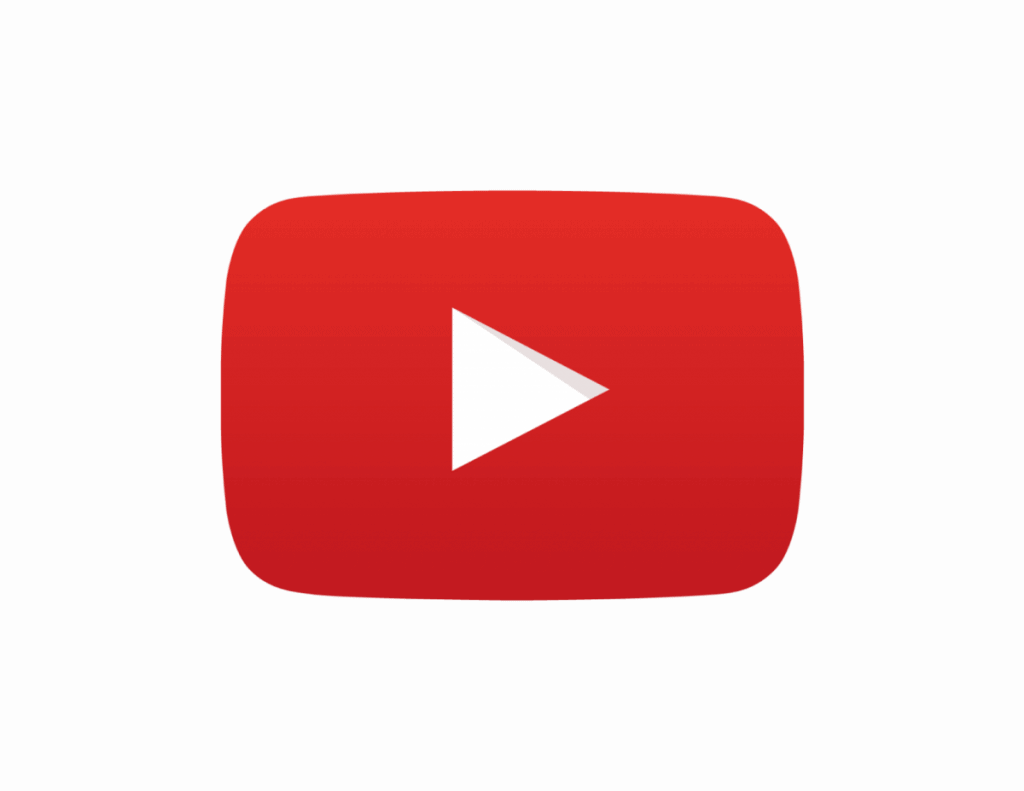Drinking alcohol is a common part of most people’s lives. Having a drink on a Friday afternoon to relax after a hard week is one of life’s pleasures. Types of alcohol are also found in some products, which can dehydrate your beard. There are good alcohols and bad alcohols that we will go through in this article.
Drinking too much alcohol is bad for a beard because it dehydrates you, can lead to zinc and protein deficiencies and create a hormonal imbalance. Adding alcohol to products is not necessarily bad if you stick to long-chain alcohols such as Cetearyl and Lauryl alcohol.
In this article, we will look at consuming alcohol and its effects on your beard and beard hair health and the effect of products with alcohol in their formulation.
Article Contents
Drinking alcohol
The type of alcohol in alcoholic beverages is ethanol. It is popularly consumed in three types: beer, wine, or distilled liquor. As long as you are over a certain age, you can purchase and consume alcohol. The minimum age varies between 16 and 25 years, depending on the country and the type of drink. For most countries, 18 years of age is the minimum legal drinking age.
The relatively young age at which you can consume alcohol means that it quickly makes its way into our lives. Depending on the culture around alcohol in your country, you may end up binge drinking on the weekends (I’m looking at you, the United Kingdom and Australia!).
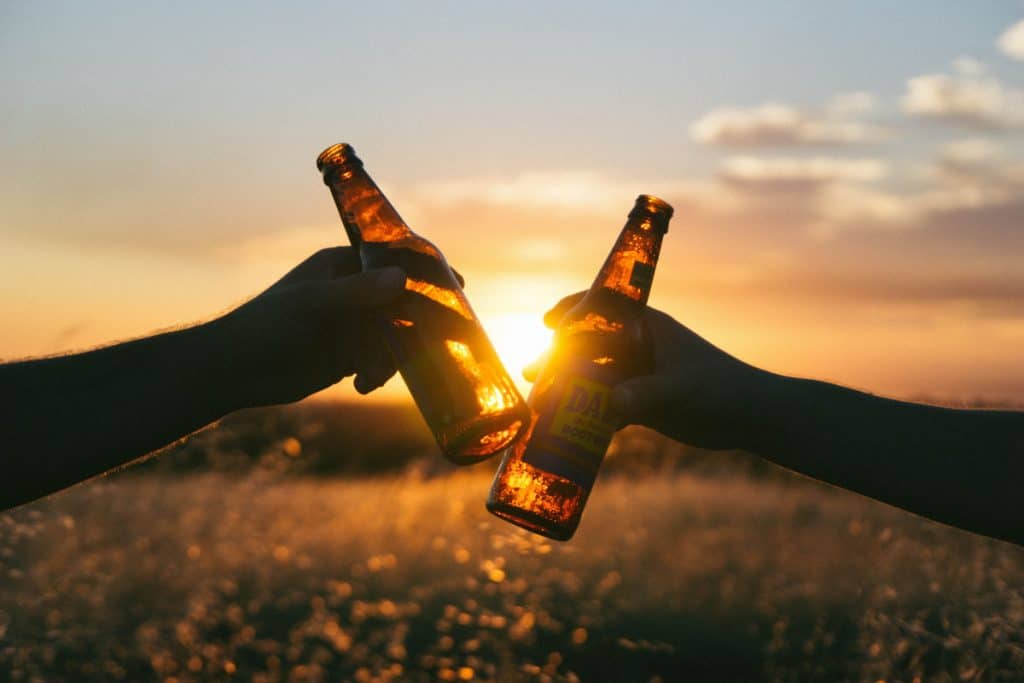
Despite its prevalence in many countries, we all know how bad alcohol is for you. There is not a single organ that isn’t affected by alcohol. From your brain to your immune system, alcohol has a wide and varied effect on every part of your body.
Here are the specific ways in which alcohol can wreak havoc with your beard.
It dehydrates you
Your beard requires constant nourishment and hydration. For our beards to remain healthy and hydrated, our bodies must also be supplied with plenty of fresh water and nutrients.
Ultimately, your beard can only grow as healthily as your body.
Consuming access to alcohol can leave your beard dry and brittle. We all know that after a few drinks, our bodies start producing more urine. Once you “break the seal”, you seem to be constantly heading to the toilet to urinate.
That is because alcohol is a diuretic.
Alcohol will cause diuresis. That means that the body will remove fluids from the blood through your kidneys much quicker, meaning you create urine more frequently.
Alcohol also causes a buildup of a toxic substance called acetaldehyde which is the chemical causing vomiting and leads to severe dehydration. The acetaldehyde is made from our livers conversion of alcohol into products that we pass through our urine.
Because you go to the toilet more often, alcohol leads to frequent urination, leading to severe dehydration if you do not drink the appropriate amount of water. When you are severely dehydrated, you will not be able to supply your beard with the appropriate amount of water and nutrients to keep it well-nourished.
Continual heavy drinking will quickly dry out your beard and cause a significant amount of dryness that only the most intense products will be able to solve in the short term.
Ignoring the dry beard warning signs will quickly result in heavy breakage and beard hair fall
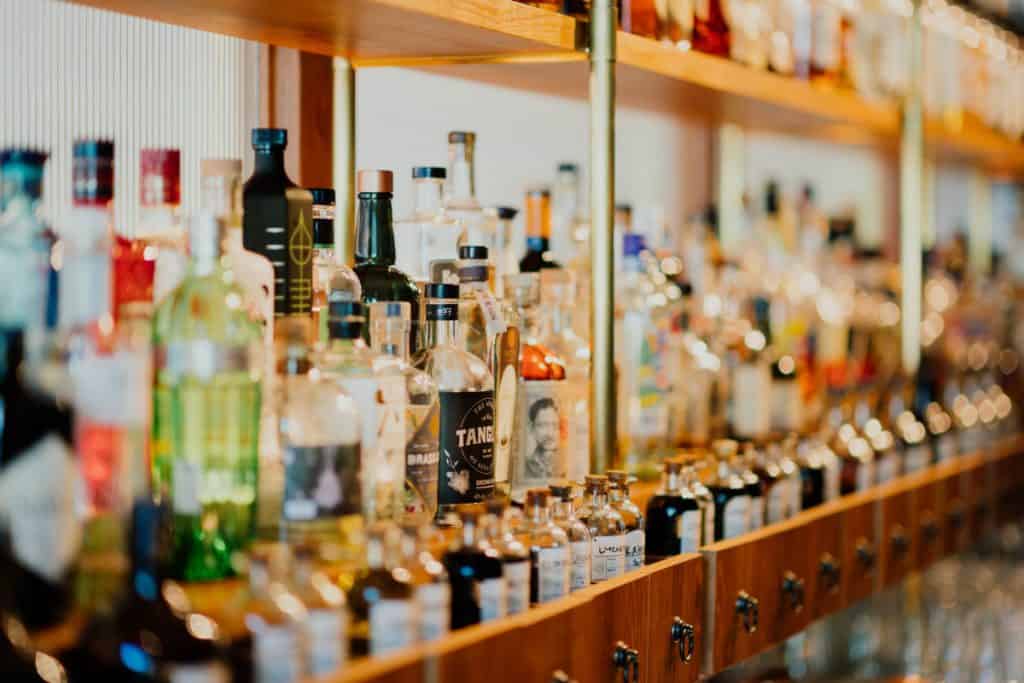
Increased alcohol consumption can lead to deficiencies
The continual consumption of alcohol can lead to deficiencies in key nutrients required for healthy beard growth.
Alcohol can cause poor absorption of nutrients and lead to deficiencies.
Some people do not eat enough of a varied diet while drinking heavily. In other cases, alcohol consumption can interfere with how the body absorbs the food during digestion – that is pretty scary stuff!
There is scientific evidence that not getting enough zinc, copper, or protein may lead to your beard falling out more often.
The deficiencies that high alcohol intake creates includes:
- Iron – Iron is an important micronutrient and is one of the most vital for supporting biological activities. There is a hormone called Hepcidin which decreases in response to low body stores of our own. This hormone helps increase iron absorption from food. Testosterone reduces Hepcidin which means that more iron is absorbed.
- Copper – Copper is an essential trace element that is vital to the health of proper metabolic processes. Copper is necessary to support the structure of the shaft of the beard hair. A deficiency can cause hair to become thin and brittle quickly.
- Zinc – Zinc is an element that you may remember from chemistry class! You can purchase zinc supplements, but it comes into its own when combined with vitamin B. Zinc can increase testosterone up to a point, but if you are not deficient in it, you will not see any increase from ingesting more.
In one study, zinc and vitamin B supplements increased sperm quality by 74%. Zinc also boosts testosterone in athletes and those who are deficient in zinc. That means if you are exercising a lot, you may want to consider taking zinc to help make sure you are not deficient.
In the case where your zinc levels are already at a good level, you’ll probably see increases in DHT, which isn’t a bad thing at all for your beard growing potential.
As you can see, with all of these important micronutrients being removed from your diet, you could easily cause your beard to become dry and brittle – the worst combination for keeping your beard thick and full.
Hormonal imbalance
Hormones are a powerful driving force in our bodies. They are responsible for a whole range of things, including regulating sleep and mood to affect our hair and beard.
Everyone’s body is different, and hormones affect everyone differently, but they can certainly impact hair and beards.
Oestrogen
Scientific studies have shown that melanin synthesis and pigment transfer to hair can be changed by hormonal signals.
Oestrogen, progesterone, and cortisol can all play a part in changes to hair colour. Still, the amount of oestrogen in the body can help determine the concentration of melanin in female hair. In males, testosterone can certainly change the texture and thickness of beard hair, increasing its darkness.
Excessive drinking raises the level of oestrogen in males.
Alcoholic beverages contain alcohol and other substances that contribute to the physiological effects of the drink. It is known that some of the plants used to produce alcoholic beverages contain oestrogen-like substances.
Studies have been performed where postmenopausal women (who produced no oestrogen themselves) see higher levels of oestrogen effects. These effects mean that alcoholic beverages are causing some of the effects we associate with the hormone oestrogen. These effects were also observed at even a moderate drinking level.
The results have also been reproduced in animal studies.
Changing your hormone levels in the body can easily result in more or less darkening of your beard hair and reduce the amount of testosterone flowing in your body.
Thyroid
Drinking too much alcohol can also affect your thyroid and the production of growth hormones. An underactive thyroid can also affect other hormone interactions responsible for a wide variety of processes in the body, including beard growth.
An overactive or underactive thyroid gland may also cause hair loss and thinning of hair.
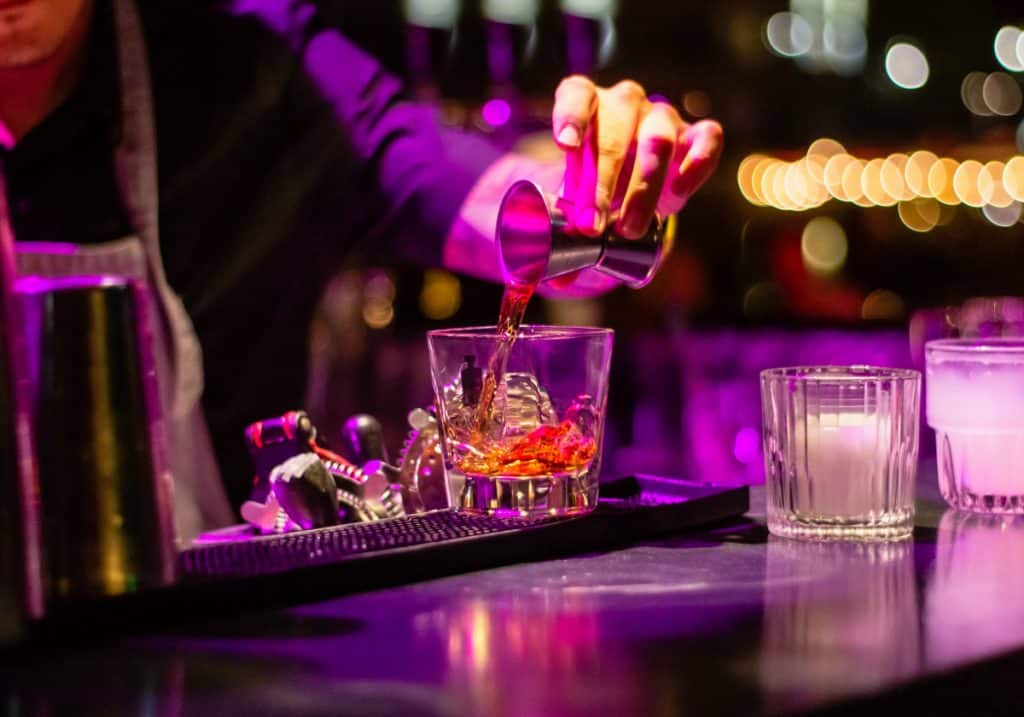
Products with alcohol in them
There are many products for beards, and some of them may contain alcohol. Having alcohol topically applied to your beard isn’t necessarily a bad thing. The term alcohol is an umbrella term for a wide variety of chemical compounds.
Let’s take a look at why some alcohols are a fantastic addition to your beard products.
Not all Alcohols are bad
You do not always need to avoid alcohol in your beard product. Some alcohols are good for your hair.
Short-chain alcohols
Short-chain alcohols that are approximately three carbon atoms long and low molecular weight are bad for your hair. These sorts of alcohols tend to be found in styling products and are included because they evaporate quickly. The quick evaporation rate means that they reduce the drying time of the hair. Unfortunately, the reduced drying time means that they also draw the water and moisture away from your hair through a wicking process.
The wicking evaporation process draws the natural moisture away from your beard hair.
The short-chain alcohol evaporation means that the surface of the hair roughened significantly and looks dull and dry.
Long-chain alcohols
Long-chain alcohols are very good for your beard. Alcohol with more than ten carbon atoms is of high molecular weight and acts as a lubricant for your hair.
The high molecular weight of these alcohols means that they provide an oil-like substance that coats the hair’s surface.
They are often derived from natural sources and are added to beard products as thickeners or emulsifiers, which stop oil and liquids from separating within the beard products.
It’s worth delving into the types of alcohol in your hair products so that you can stay clear of any short-chain alcohols such as ethanol, isopropyl alcohol, denatured alcohol and others.
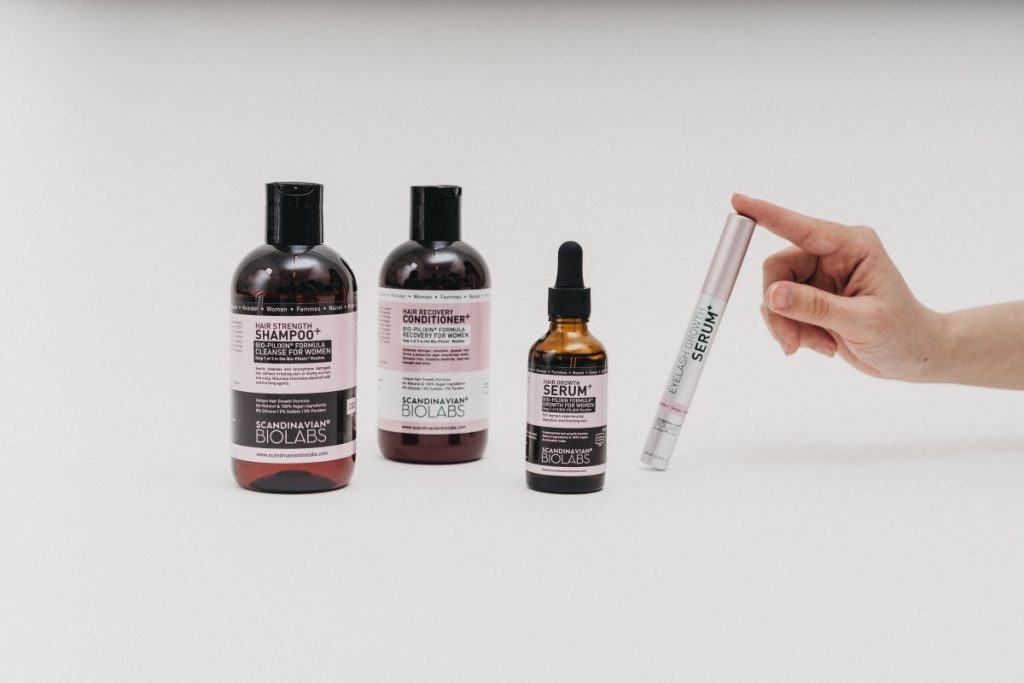
How to reverse alcohol effects on a beard
The good news is that you can easily reverse the effects of alcohol on your beard.
By eating a healthy diet that can replace the deficiencies you have created through consuming a lot of alcohol to minimising the alcohol you use topically on your beard – there are plenty of options for reversing the detrimental effects of alcohol on your beard.
A balanced and healthy diet
There are also plenty of beneficial nutrients in these foods for growing your beard:
- Berries and citrus – vitamin C is a very strong antioxidant and can be found in berries, oranges, kiwi fruits, and strawberries. Vitamin C can protect the beard follicle against damage from free radicals in the body. Vitamin C is also used to produce collagen for your hair.
- Spinach and kale – spinach and kale contain vitamin C and vitamin A. It helps the glands in the face produce sebum. Sebum is an oil produced by your face to keep the hair and the skin well-conditioned. As your beard gets longer see them will become very important in keeping it conditioned.
- Fatty fish – some types of fatty fish contain a huge amount of omega-three fatty acids. Omega-three fatty acids can promote hair growth in tuna, salmon, sardines, mackerel, trout, and other fish.
- Avocados – Avocados are delicious and a wicked source of healthy fats. They contain a huge amount of vitamin E, which, like vitamin A, helps combat oxidative stress caused by free radicals in the body. One study resulted in people with hair loss seeing 34.5% more hair growth after taking Vitamin E for eight months.
- Nuts and seeds – Almonds and sunflower seeds are a delicious way to boost nutrients to your meals. Nuts and seeds contain vitamin B, vitamin A, zinc, selenium, and omega-three fatty acids
Foods rich in zinc
If you are drinking a lot of alcohol, you should consider eating many foods that contain zinc.
- Rock oysters – 20.25 mg per 100 g
- Lamb – 10 mg per 100 g
- pumpkin seeds – 7.5 mg per 100 g
- almonds – 3.5 mg per 100 g
Drink water
Drink plenty of water to minimise the dehydration effects of alcohol. If you are drinking alcohol, I would recommend alternating an alcoholic beverage with water. By alternating, you are increasing your chances of remaining hydrated. I know that this is easier said than done on an exciting night out with your friends.
Drinking water can sometimes be a little bit boring, so here are some ideas to increase your water intake throughout the day:
- carry a reusable water bottle – carrying a reusable water bottle will increase the chances that you will take sips regularly
- change the temperature – using a non-caffeinated tea will help you increase the amount of water you consume during the day
- add citrus – if you do not like the taste of water, I recommend adding a few cut-up citruses such as lemon and lime to improve the taste of your water
Minimise your alcohol intake
One of the best ways to stop alcohols effects on your beard is to reduce your intake significantly.
Avoiding places where you drink the most was one of the most effective ways I stopped drinking alcohol. Avoiding bars and common triggers will mean you don’t have to rely on willpower to minimise your alcohol intake.
Organise alcohol-free events with your friends and suggest venues where mocktails are available.
Swapping out your friends (occasionally) for non-drinking friends will also decrease the amount of alcohol you drink socially.
Stop using any alcohol (isopropyl alcohol) based products on your beard
To stop the effects of topical alcohol on your beard, I recommend looking at the ingredients and formulations of the products currently in your beard toolkit.
Is alcohol bad for a beard? Summary
In this article, we have been through everything you need to know about drinking alcohol and the topical application of alcohol for your beard.
Ultimately, drinking alcohol is only a bad thing for your beard. It can cause dehydration, deficiencies, and dryness leading to brittleness and increased beard hair fall.
On the other hand, your beard products may contain alcohol, but not all alcohols are bad. Avoiding short-chain alcohols for topical beard treatments will minimise the drying effect they have on the beard hair.

![Why alcohol is terrible for a beard [The strange effects]](https://beardgrowingpro.com/wp-content/uploads/2021/10/Why-alcohol-is-terrible-for-a-beard.jpg)

